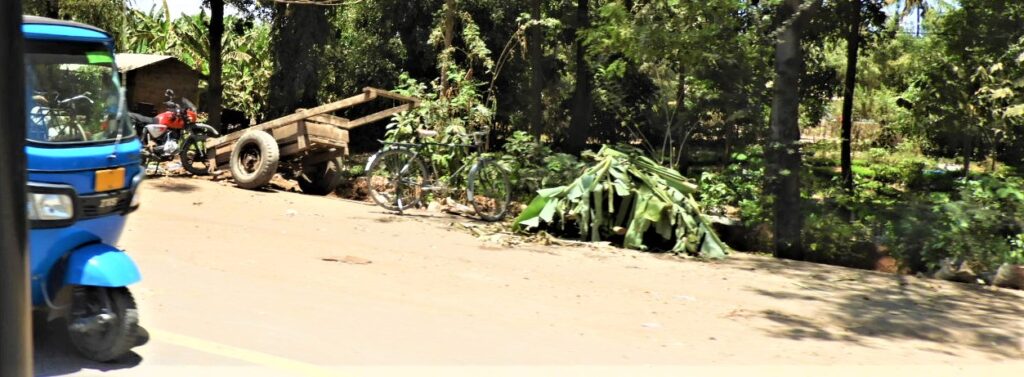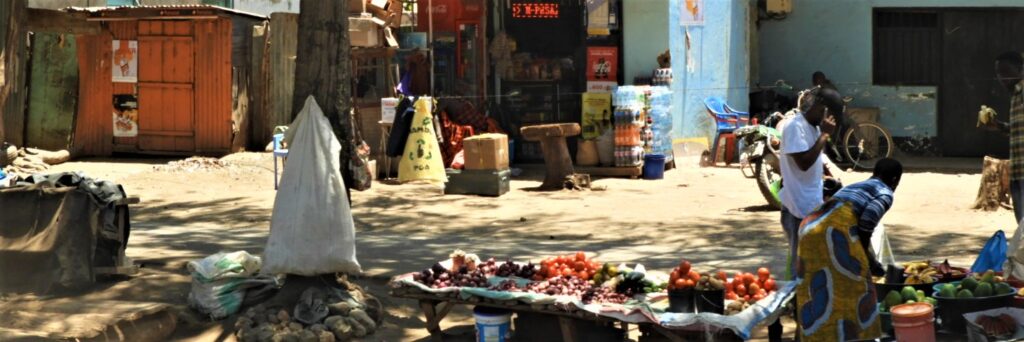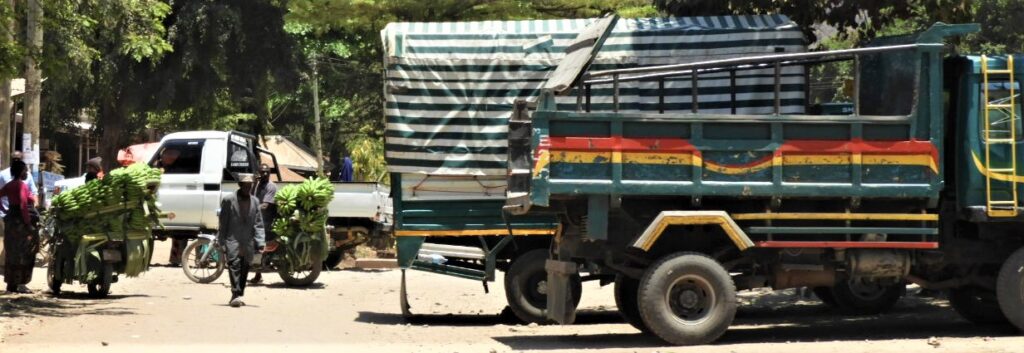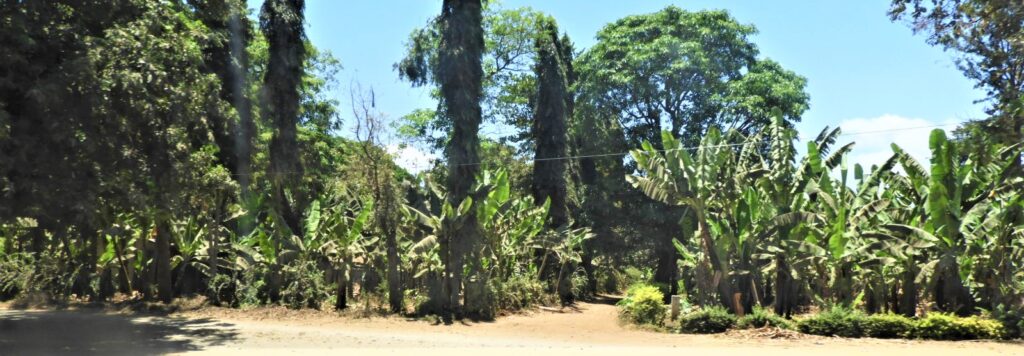» posted on Tuesday, September 20th, 2022 by Linda Lou Burton
Quickies: The Town
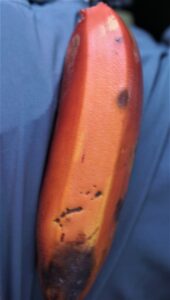 Linda Lou Burton posting from Mto Wa Mbu Village, Tanzania– The Quest For a Red Banana. Willy wanted to gas up the 4×4 and clean the inside a bit more from our morning explosion. Venita needed a bank. I wanted to see more of the banana trees we’d hurried past the night before. And Judy wanted to buy a red banana. Ben mentioned red bananas as something very “Tanzanian,” and Judy immediately said “Wow! Red bananas? Wow! How do they taste? Wow! RED bananas! Let’s go get some!” That’s why Willy turned right out of the Park and drove into Mto Wa Mbu, a touristy town in a handy dandy place for tourists halfway between Mt Kili-Arusha and the Ngorongoro Crater-Serengeti. Like us. The village is a crossroads for locals too; an agricultural hub famous for its crops of rice and bananas – yes, the distinctive RED bananas grow here. Red onions grow here too, as do tomatoes, coconuts, garlic, avocado, beans and more; trucks roll through town hauling the colorful crops. Add to this mix an incredible cultural diversity – 120 tribes live in the area; and the animal migration route — Mto Wa Mbu is in two wildlife corridors; and you can see this little town deserves a Wow!
Linda Lou Burton posting from Mto Wa Mbu Village, Tanzania– The Quest For a Red Banana. Willy wanted to gas up the 4×4 and clean the inside a bit more from our morning explosion. Venita needed a bank. I wanted to see more of the banana trees we’d hurried past the night before. And Judy wanted to buy a red banana. Ben mentioned red bananas as something very “Tanzanian,” and Judy immediately said “Wow! Red bananas? Wow! How do they taste? Wow! RED bananas! Let’s go get some!” That’s why Willy turned right out of the Park and drove into Mto Wa Mbu, a touristy town in a handy dandy place for tourists halfway between Mt Kili-Arusha and the Ngorongoro Crater-Serengeti. Like us. The village is a crossroads for locals too; an agricultural hub famous for its crops of rice and bananas – yes, the distinctive RED bananas grow here. Red onions grow here too, as do tomatoes, coconuts, garlic, avocado, beans and more; trucks roll through town hauling the colorful crops. Add to this mix an incredible cultural diversity – 120 tribes live in the area; and the animal migration route — Mto Wa Mbu is in two wildlife corridors; and you can see this little town deserves a Wow!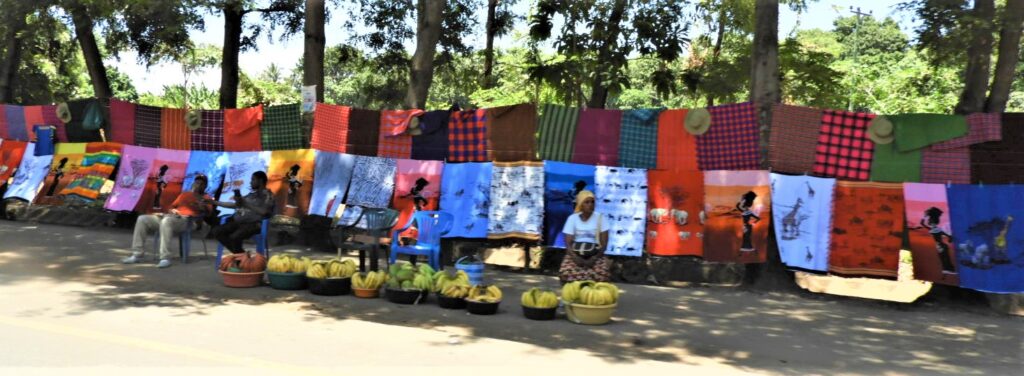
A shame we only had 30 minutes to spend here. Time enough to see the colorful shukas hanging on a line outside the Park, the colorful tuk-tuks ready for a ride, the colorful produce by the basketsful, and the bustle of noisy commerce. Willy took care of the 4×4. Venita took care of her business at the bank. And Judy got her red banana. I saw the banana trees again, another quick wave from the highway, no tuk-tuk ride through the rows. But I did learn this (which I’d wondered about) – Mto Wa Mbu means “river of mosquitoes” in Swahili.
A few photos of our Quickie Visit to the town.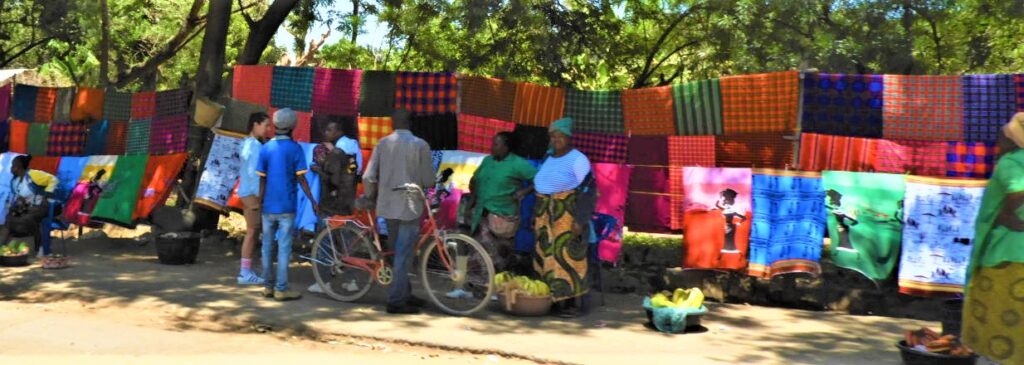
Mto Wa Mbu Village Information
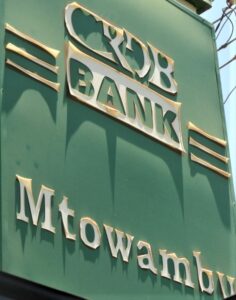 Mto wa Mbu has a population of 12,000+; 40,000+ in the area. Settled by the Mbugwe, Iraqw, Gorowa, Irangi, Totoga, Chagga and Maasai, the area is the most linguistically diverse and complex in Africa. It is the only place in the continent where the four major African language families – Bantu, Khoisan, Cushitic, and Nilotic – occur together.
Mto wa Mbu has a population of 12,000+; 40,000+ in the area. Settled by the Mbugwe, Iraqw, Gorowa, Irangi, Totoga, Chagga and Maasai, the area is the most linguistically diverse and complex in Africa. It is the only place in the continent where the four major African language families – Bantu, Khoisan, Cushitic, and Nilotic – occur together.
The main water sources in the area are the Mahamoud, Kirurumu and Magadini Rivers; the banana trees are watered by irrigation systems from these rivers. Green bananas grow in nine months; red bananas require one year, and each tree only produces one bunch.
Animals commonly seen in the area on the migration routes include elephant, hippo, giraffe, wildebeest, zebra, gazelle, monkey, and baboon.
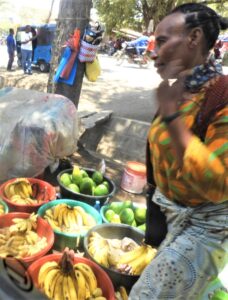 Mto Wa Mbu Village has an active cultural program showing visitors the traditional way of life of the villagers through various activities and a range of community projects. You can visit top spots in the area, taste Tanzanian foods, and experience authentic cultural interaction. A fee is charged for each activity which is then used to support income-generating projects such as the production of energy-efficient stoves and the development of irrigation systems. Students will find the village and its people to be a great resource for information on Tanzania. Everyday topics can be explored as well as more complex subjects like politics, history and culture, wildlife and legends. There are a number of excellent walking, hiking and biking tours offered in the village ranging in length from a few hours to a full day (bikes can be hired in the village).
Mto Wa Mbu Village has an active cultural program showing visitors the traditional way of life of the villagers through various activities and a range of community projects. You can visit top spots in the area, taste Tanzanian foods, and experience authentic cultural interaction. A fee is charged for each activity which is then used to support income-generating projects such as the production of energy-efficient stoves and the development of irrigation systems. Students will find the village and its people to be a great resource for information on Tanzania. Everyday topics can be explored as well as more complex subjects like politics, history and culture, wildlife and legends. There are a number of excellent walking, hiking and biking tours offered in the village ranging in length from a few hours to a full day (bikes can be hired in the village).
- Village Tour – try banana beer, visit a traditional home, learn about Makonde carving
- Village Lunch – enjoy a home-cooked meal the traditional way
- Farm Visit – discover what the villagers grow and how they do it
- Maasai Tour – visit a traditional boma (enclosure), interact with tribal members in various activities
- Maasai Market -browse the weekly market on Thursday afternoons or the monthly market on the 22nd
- Balaa Hill – climb up the Rift Valley Wall for magnificent views and good birding
- Miwaleni Lake and Waterfall – see ancient baobab trees and swim in the pool below the falls
- Lake Manyara – bike through a wildlife corridor to the shores of the lake
Mto Wa Mbu Village https://www.safari.co.za/Tanzania_Travel_Guide-travel/mto-wa-mbu-village.html

